Our top recommended VPN for just about any use case is ExpressVPN — and according to the company, it has over 4 million subscribers¹, so it‘s clearly doing something right. Still, these are two long-established, heavyweight VPNs with solid reputations. Both are owned by Kape Technologies, yet they’re managed by separate teams, so they contrast vastly in terms of user interface and functionality. Differentiating them is easy, but picking a winner is harder.
The key difference is that Private Internet Access (PIA) requires more technical know-how and has a wide array of adjustable features. Conversely, ExpressVPN is a solid all-around service that can tackle multiple online activities with minimal configuration.
So, while I had plenty of fun tinkering with PIA’s settings, ExpressVPN is the clear winner. It’s just as technically impressive as PIA, yet its workings are hidden beneath the surface. With a strong commitment to security and privacy that doesn’t interrupt your daily activities, ExpressVPN is a great choice. You can try it without risk as every plan is backed by a 30-day money-back guarantee*.
Short on Time? Here Are My Key Findings
|
ExpressVPN |
Private Internet Access |
| ⭐ Overall Rating |
Rated 9.87/10
www.expressvpn.com |
Rated 9.54/10
www.privateinternetaccess.com |
| 💲 Lowest Monthly Price |
$2.79/month for a 1-year plan + 3 months free |
$2.03/month for a 2-year plan + 2 months free |
| 🗓️ Price on Renewal |
$116.95 per year
(subject to change) |
$56.94 per year
(subject to change) |
| 🤑 Coupons |
ExpressVPN 78% Off 1-year + 3 months free |
PIA 83% Off 2 years + 2 months free |
| 💸 Money-Back Guarantee |
30 days |
30 days |
| 📺 Streaming |
Works with Netflix, Hulu, Disney+, Amazon Prime, DAZN, ESPN, iPlayer, Sky TV, and more |
Works with Netflix, Hulu, Disney+, Amazon Prime, iPlayer, and more |
| 🌍 VPN Servers |
105 countries with 3,000 servers |
91 countries with 29,650 servers |
| ⚡ Speed |
1% speed drop on nearby servers, 7% on long-distance connections |
5% speed drop on nearby servers, 34% on long-distance connections |
| 🎮 Gaming Performance |
Optimal speed and ping |
Decent speed and ping |
| 🧑🤝🧑 P2P Support |
Yes, on all servers |
Yes, on all servers |
| 🔐 Security Protocols |
Lightway (UDP & TCP), OpenVPN (UDP & TCP), and IKEv2 |
OpenVPN (UDP & TCP) and WireGuard |
| 🔌 Kill Switch |
Yes, Network Lock |
Yes, with 2 options |
| ✅ IP/DNS Leak Protection |
Yes |
Yes |
| 🏢 Based in Country |
British Virgin Islands |
US |
| ⚠️ Does VPN Keep Logs |
No |
No |
| Works in China |
Yes* |
Maybe |
| #️⃣ Number of Device Connections |
14 |
Unlimited |
| 💻 Device Compatibility |
Windows, macOS, iOS, Android, Linux, Chrome, Firefox, and Edge
Plus, a native app for routers |
Windows, macOS, iOS, Android, Linux, Chrome, Firefox, and Opera
Plus, manual router installation |
| 🔧 Customer Support |
24/7 live chat, knowledge base, FAQs, and email |
24/7 live chat, knowledge base, FAQs, and email |
*ExpressVPN is known to be reliable, but connections in China can be unstable.
Streaming — An Easy Win for ExpressVPN
ExpressVPN typically provides faster and more reliable connections than PIA, allowing you to stream content from anywhere in HD. Both services support these platforms, but ExpressVPN provides extremely fast loading speeds for seamless binge-watching. Is ExpressVPN blocked by Netflix? No — in fact, during our tests, we managed to access 20+ Netflix libraries in UHD. Below is a full report of our results with both VPNs.
| Streaming Platform |
ExpressVPN |
Private Internet Access |
| Netflix |
✅ Yes, including popular Netflix
libraries like the US, UK, Canada,
Japan, South Korea, and Switzerland |
✅ Yes, but less reliable for some libraries |
| Disney+ |
✅ Yes |
✅ Yes |
| ESPN |
✅ Yes |
❌ No |
| (HBO) Max |
✅ Yes |
✅ Yes |
| Hulu |
✅ Yes |
✅ Yes |
| Sky |
✅ Yes |
❌ No |
| Amazon Prime Video |
✅ Yes |
✅ Yes |
| BBC iPlayer |
✅ Yes |
❌ No |
| ABC |
✅ Yes |
✅ Yes |
| CBS |
✅ Yes |
✅ Yes |
| NBC |
✅ Yes |
✅ Yes |
PIA offers streaming-optimized servers in 11 countries, which is great for securely accessing the content in these regions. During our tests, we tried its UK streaming server. Unfortunately, it didn’t work with iPlayer this time, although it did in the past. Channel 4 was slow to load, but it worked in the end. We had no issues with ITVX, though, and could stream the platform with no buffering.
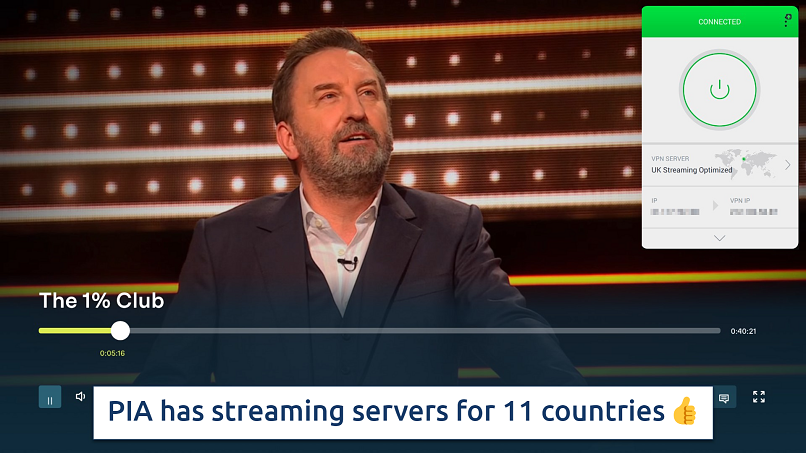 PIA's streaming servers include the US, Canada, UK, Italy, Germany, Japan, and Australia
PIA's streaming servers include the US, Canada, UK, Italy, Germany, Japan, and Australia
Meanwhile, all of ExpressVPN’s 3,000 servers support streaming. It worked with UK platforms, like BBC iPlayer, ITVX, Sky Sports, and RTE. We streamed US content on Max, Hulu, and more, while we could also watch German content, like RTL+, lag-free.
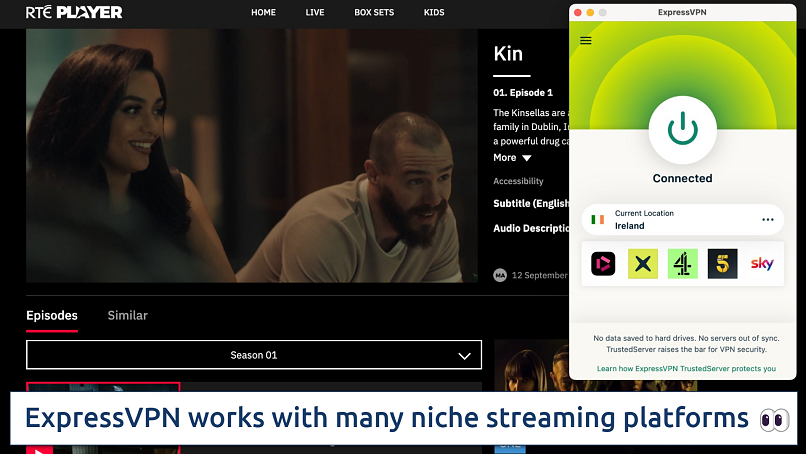 You can "favorite" your favorite platforms and sites for one-click streaming on the ExpressVPN app
You can "favorite" your favorite platforms and sites for one-click streaming on the ExpressVPN app
Both VPNs offer native apps for a selection of smart TVs, including Apple TV, Fire TV, and Android TVs. For devices that don’t support VPN applications directly, such as game consoles and some smart TVs, ExpressVPN's MediaStreamer (Smart DNS feature) is easy to set up and is reliable, but it only works with select UK and US streaming platforms. PIA also offers a Smart DNS option, but while the performance isn’t as reliable, it works for streaming in the US, UK, Japan, the Netherlands, and Germany.
Be advised: The VPNs we recommend follow strict no-logs policies, so your online activities aren't monitored or recorded. This means you’re responsible for following the terms and conditions of the streaming platforms you use. At vpnMentor, we don’t condone copyright infringement, so please use your VPN within the regulations of your region.
Winner
ExpressVPN is the superior choice for streaming as it’s more reliable with a range of worldwide platforms.
Server Network — ExpressVPN Wins With Quality Over Quantity
|
ExpressVPN |
Private Internet Access |
| Total Countries With Servers |
105 |
91 |
| Number of Servers |
3,000 |
29,650 |
ExpressVPN has far fewer servers, but they’re spread across a few more countries. PIA’s coverage is excellent in the US, where it has servers in every state, and you’ll never struggle to find a nearby location from wherever you are in the country.
Saying that, I found that ExpressVPN’s servers are faster and far more versatile. Despite the smaller network, I never came across any server congestion either.
In terms of infrastructure, both PIA and ExpressVPN offer a set of virtual servers. These allow for expanded network coverage while providing private IP addresses in more VPN-restrictive locations (such as India). PIA also offers several colocated (self-owned) connections in its network, called NextGen servers. These offer strong privacy protection as they eliminate the third-party involvement that comes with renting servers.
Winner
PIA heavily outnumbers ExpressVPN with nearly 10 times as many servers. Yet the latter proves that it’s not just the size of the network but what you do with it that counts.
Speed — ExpressVPN Is Miles Ahead
Our UK-based tester had starting speeds of around 230 Mbps and used the fastest protocol for each service. For ExpressVPN, that was Lightway, its exclusive lightweight, built-for-speed protocol. For PIA, that was WireGuard, the industry-standard, open-source option for speedy connections.
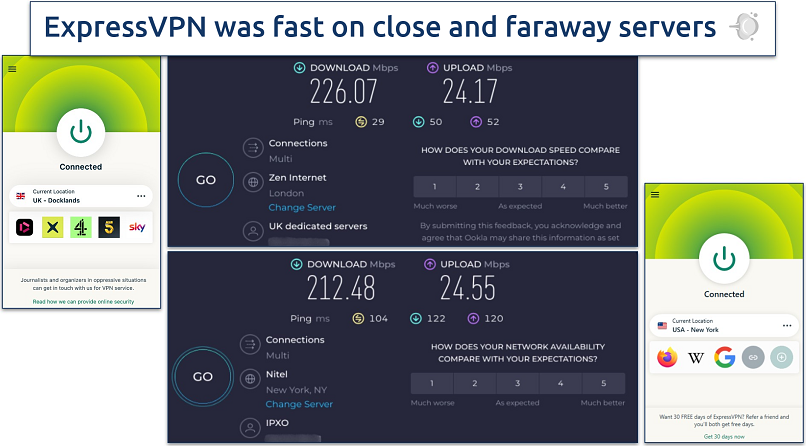 ExpressVPN's ping of 104 ms from New York was very impressive
ExpressVPN's ping of 104 ms from New York was very impressive
Nearby speeds were comparable — we found a 1% drop with ExpressVPN and a 5% drop with PIA, which is really impressive on both counts. However, the difference was more stark when connecting across the Atlantic.
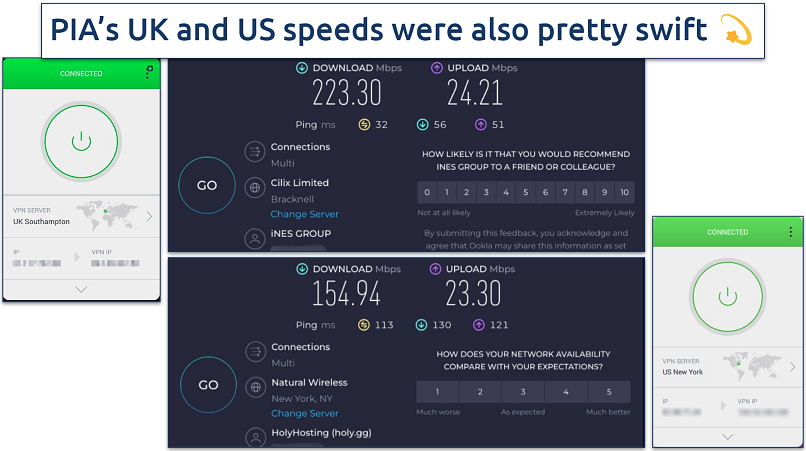 PIA's ping from New York and Southampton (UK) weren't far behind ExpressVPN's
PIA's ping from New York and Southampton (UK) weren't far behind ExpressVPN's
ExpressVPN’s New York server offered a 7% speed drop, compared to 34% with the same location using PIA. This was really surprising, considering that PIA has a higher server coverage in the US. We found similar results when testing servers in Australia, Germany, and Canada. Only PIA’s Japan speeds were a shade faster than ExpressVPN.
| Speed Tests |
ExpressVPN Average Download Speed |
Private Internet Access Download Speed |
ExpressVPN Average Upload Speed |
Private Internet Access Average Upload Speed |
| Connected to a US server |
212.48 Mbps |
154.94 Mbps |
24.55 Mbps |
23.30 Mbps |
| Connected to a UK server |
226.07 Mbps |
223.3 Mbps |
24.17 Mbps |
24.01 Mbps |
| Connected to a Japan server |
137.36 Mbps |
143.19 Mbps |
21.68 Mbps |
23.84 Mbps |
Winner
ExpressVPN was notably faster in both download and upload speeds in almost all of our tests. While PIA was still fast, it was noticeably slower on long-distance connections.
Gaming — ExpressVPN’s Has Lower Latency
Ping is the critical stat when it comes to gaming. It measures the time between your commands and the server response — the lower your ping, the less laggy your gaming will be. Our UK-based speed tester gathered the data for this section, and they have a base ping of 32 ms.
Once again, ExpressVPN wins due to its proprietary Lightway protocol. It was built to remove all the unnecessary code that you don’t need in a commercial VPN protocol, so it doesn’t slow your data requests down as much as WireGuard with PIA. That said, PIA only just lags behind.
|
ExpressVPN Lightway |
PIA WireGuard |
| Quick Connect |
29 ms |
32 ms |
| Connected to a US server |
104 ms |
113 ms |
| Connected to a UK server |
29 ms |
32 ms |
| Connected to a Japan server |
274 ms |
265 ms |
Under 100 ms is considered optimum for smooth gameplay, which both VPNs comfortably provide. However, if you want to play in your own region when you’re traveling abroad, ExpressVPN is the one to go for, as it has lower ping on long-distance connections. It’s also worth pointing out that both VPNs support Xbox, PlayStation, and Nintendo Switch gaming consoles via router installation.
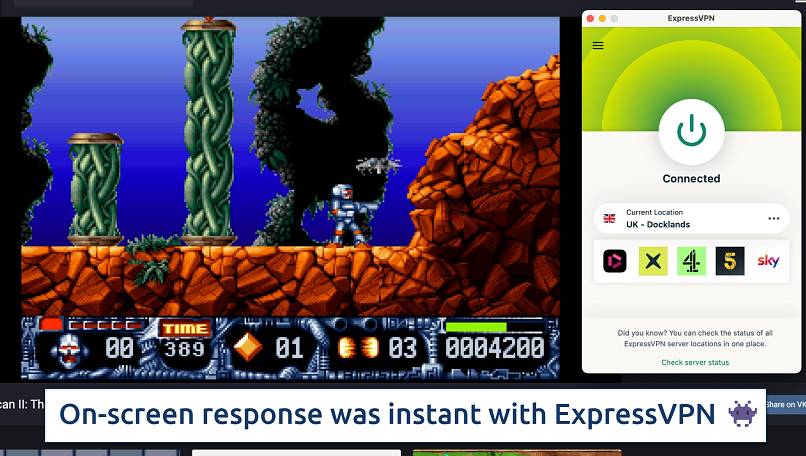 We were in retro heaven when gaming with ExpressVPN's low ping
We were in retro heaven when gaming with ExpressVPN's low ping
Winner
With a lower ping on most connections, it’s another win for ExpressVPN. Neither was suitable for extremely long-distance gaming connections, but I rarely find VPNs that are.
Torrenting — Draw
Important: While torrenting is legal in most jurisdictions, downloading copyrighted materials isn’t. We do not endorse the use of a VPN in this manner. Always check your local laws and regulations, and be careful only to download works in the public domain.
I recommend ExpressVPN if you just want an out-of-the-box service that supports P2P on every server. It has automatic obfuscation, so you can even torrent over restrictive networks at work, college, or over public WiFi. If it detects VPN or media blocks, it disguises your data as regular traffic to evade detection.
PIA has a host of adjustable settings to optimize your connections for torrenting. You can activate the Advanced Kill Switch, which blocks your internet entirely until the VPN is connected, so you never accidentally start file sharing over an unsecured network.
You can also use PIA’s Multi-Hop for extra security. This lets you route your VPN connection through a SOCKS5 or Shadowsocks proxy, which has the added bonus of obfuscating your connection, too. When I tried this, it slowed my connection slightly more than with ExpressVPN.
ExpressVPN only supports port forwarding through its router firmware, but the forwarded ports are not protected by the VPN's encrypted tunnel. Conversely, PIA offers in-app port forwarding on most servers, providing a more convenient setup and an encrypted connection. However, ExpressVPN pushes forward with its better speeds, and both offer malware protection and strict no-logs policies. So this round is a tie.
Winner - draw
 /
/
These VPNs offer a very different torrenting experience, so it depends on your level of technical preference.
Security — PIA Wins With a Vast Array of Customizable Features
ExpressVPN’s Lightway security protocol gives it an edge, enhancing both speed and security. This makes it a suitable choice if flexibility is important to you. Private Internet Access sticks with OpenVPN and WireGuard, which are reliable but don't offer the proprietary benefits of Lightway.
While both ExpressVPN and PIA offer robust encryption, ExpressVPN doubles down on security with perfect forward secrecy. That way, each session uses a unique key, preventing decryption of past or future communications — even if one key is compromised.
| Security Feature |
ExpressVPN |
Private Internet Access |
| Encryption level |
AES-256-GCM with 4096-bit DH key, HMAC authentication |
AES-128-GCM, AES-256-GCM, SHA256 authentication, 4096-bit DH key |
| Kill switch |
All operating systems. Use Lightway protocol when activating it on iOS |
All operating systems, including Advanced Kill Switch option |
| DNS/IP leak protection |
Yes |
Yes |
| Protocols |
Lightway (UDP & TCP), OpenVPN (UDP & TCP), and IKEv2 |
OpenVPN (UDP & TCP) and WireGuard |
| Split tunneling |
Yes (except macOS) |
Yes (in beta testing on macOS) |
| Private DNS servers |
Yes |
Yes |
| Tor Over VPN servers |
No |
No |
| RAM-only servers wipes data |
Yes |
Yes |
| Ad & malware blocker |
Yes, Threat Manager (Advanced Protection) |
Yes, MACE |
| Double hop servers |
No |
Yes |
| Dedicated IP addresses |
Yes |
Yes |
| Obfuscation technology |
Yes |
Yes |
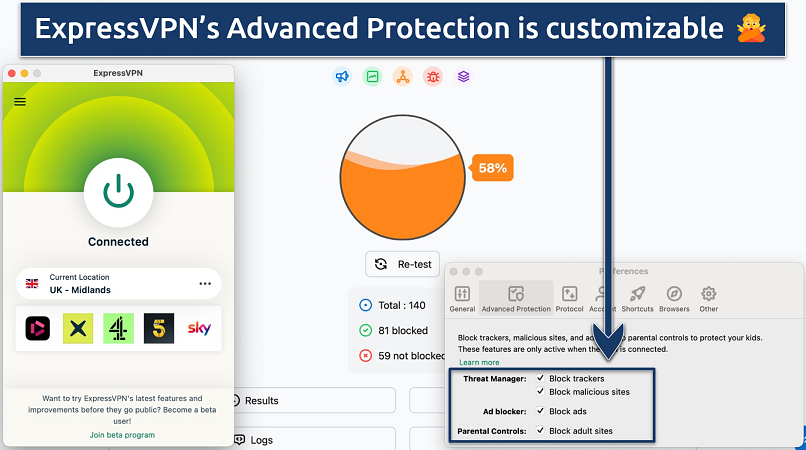 ExpressVPN's blockers are in Settings > Advanced Protection
ExpressVPN's blockers are in Settings > Advanced Protection
If ad blocking is a priority, PIA’s MACE will appeal. In my tests, it blocked an incredible 97% of ads, trackers, and malware. While ExpressVPN blocked a relatively modest 58%, it is at least customizable. For instance, you can select to block any combination of ads, trackers, and malware — plus, there’s a Parental controls feature that prevents adult sites from loading. MACE is a simple one-click solution, which is unusual for PIA.
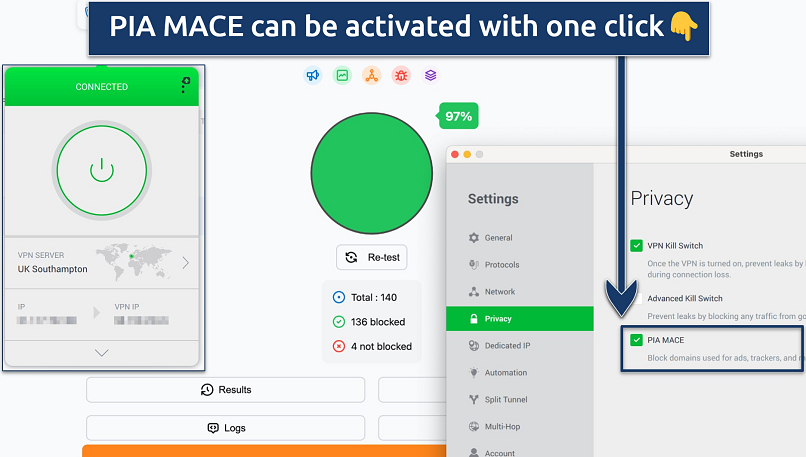 PIA MACE is far more effective than many standalone ad and malicious content blockers
PIA MACE is far more effective than many standalone ad and malicious content blockers
PIA’s greatest strength is its breadth of customizable security features. You can balance your speed and security by switching encryption levels with OpenVPN. With both protocols, you can configure which ports your connections use, as well as your maximum transmission unit (MTU). Plus, you can set the VPN to connect automatically if it detects you’re using a public WiFi network, which is great for keeping you secure while you’re on the go.
Both ExpressVPN and PIA offer dynamic IPs, which is good for privacy since this means they switch the IP address you get each time you connect to a location.
When it comes to remote work or office use, I’d say ExpressVPN is the preferred choice with its simplistic design and reliable versatility with a broad range of tasks. However, PIA’s abundance of security features and customization options gives it the overall win in the security category.
Winner
Both these services offer excellent security protection, but PIA’s plethora of adjustable settings gives it the edge.
Privacy — ExpressVPN Goes the Extra Mile for Its Users
ExpressVPN and PIA assert a strict no-logs policy, which is great for your browsing privacy. However, ExpressVPN’s HQ is in the British Virgin Islands, a locale without data retention requirements, while PIA’s base is in the US, subject to stricter surveillance under the 5 Eyes Alliance.
ExpressVPN retains minimal, anonymous usage data solely used for app improvement purposes. This data includes the app versions used, dates (not times) when connected to VPN servers, choice of VPN server location, and total amount of data transferred per day.
That said, PIA states in its privacy policy that it may disclose collected personal data to necessary members in its group of companies, which sounds concerning at first. However, it goes on to say that this is necessary to provide a service that aligns with its privacy policy, and its commitment to user privacy is paramount.
Both VPNs have proven their unwavering commitment to protecting user privacy. ExpressVPN has undergone 19 independent audits so far, covering its privacy policy, apps, protocol, server infrastructure, and more.
On the other hand, PIA has had fewer audits, but it does publish quarterly transparency reports that are publicly viewable. Plus, its no-logs promises have held up in court cases — when user data was requested, there was none to show. ExpressVPN has also proven itself in a case when Turkish authorities seized a server in an investigation, only to find no usable data.
The open-source approach of PIA allows anyone to inspect its code for potential vulnerabilities, an advantage if transparency is a priority. While ExpressVPN’s apps aren’t open-source, its browser extensions and Lightway protocol are, so there’s at least some visibility of what’s going on under the hood.
Meanwhile, ExpressVPN found a significant security flaw with its Windows app back in February 2024, which it fixed by April. Is ExpressVPN still trustworthy? Yes — after the flaw was discovered, it commissioned a third-party audit to ensure it was completely fixed and published a white paper detailing the matter. And luckily, only 1% of its Windows users were affected, according to Hackread². This demonstrates how seriously ExpressVPN considers its users’ privacy and that it continuously invests in providing the best service it can.
Winner
ExpressVPN is better for privacy due to its location in the British Virgin Islands, which shelters it from surveillance laws. Regular and transparent third-party audits further underscore its commitment to user privacy.
Works in China — ExpressVPN Is More Effective
Important: China’s strict internet regulations mean that VPN connections can be unreliable in the country. However, ExpressVPN offers a 30-day money-back guarantee that lets you test it out without financial risk. Only VPNs sanctioned by the government are permitted in China, and these aren’t generally considered safe. There have been no publicly documented cases of tourists being penalized for using an unsanctioned VPN, but we still advise you to exercise caution. Always ensure you stay up to date with current laws and regulations.
The status of VPNs in China is complicated. Even the best VPNs stop working in China from time to time as the country continually updates its Great Firewall (GFW) technology.
Overall, ExpressVPN is the best of the two for China. It outshines PIA in obfuscation technology, mimicking HTTPS traffic better than PIA's Shadowsocks, and works a lot more reliably in China as a result. While PIA claims it can work in China, it is also clear that it doesn’t guarantee service there.
Both VPNs offer servers in Macau, which is in China but isn’t subject to the Great Firewall.
Winner
ExpressVPN is the better option for China due to its specialized obfuscation technology that allows it to work more reliably in the country.
Installation & Ease of Use — ExpressVPN Is Sleek and Intuitive
Both ExpressVPN and PIA offer straightforward installation across various devices, but you may notice that ExpressVPN takes the lead in simplicity, particularly on mobile platforms. It sets up with fewer taps and gets you connected faster. On desktops, both VPNs are clean and user-friendly, though ExpressVPN has the edge with its sleek interface.
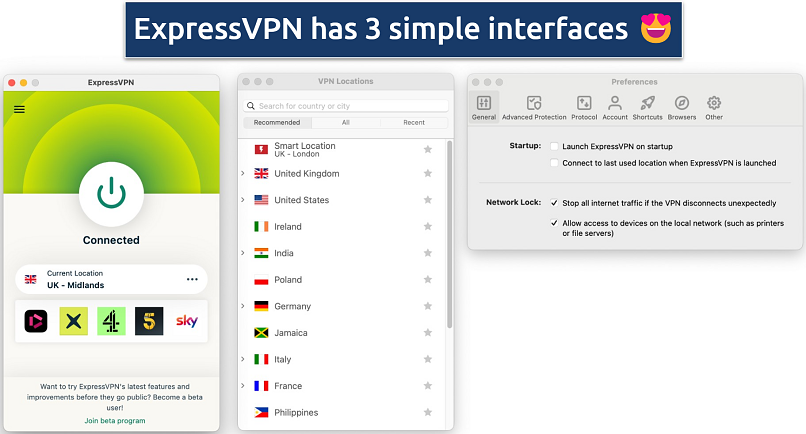 ExpressVPN's server list is simple and easy to navigate
ExpressVPN's server list is simple and easy to navigate
PIA has two “views” — the app opens in a condensed view that shows the location you’re connected to, but you can expand it to see more details. Personally, I really like seeing this extra technical information, and I think it’s great you can hide it unless you need it. The expanded version of the app, unfortunately, takes up a lot of space on your screen. That said, there is a nice “bookmark” function that you can click (or tap on mobile) that will move your most-used features toward the top of the displayed settings for quick access. It’s still fairly intuitive, but not as much as ExpressVPN.
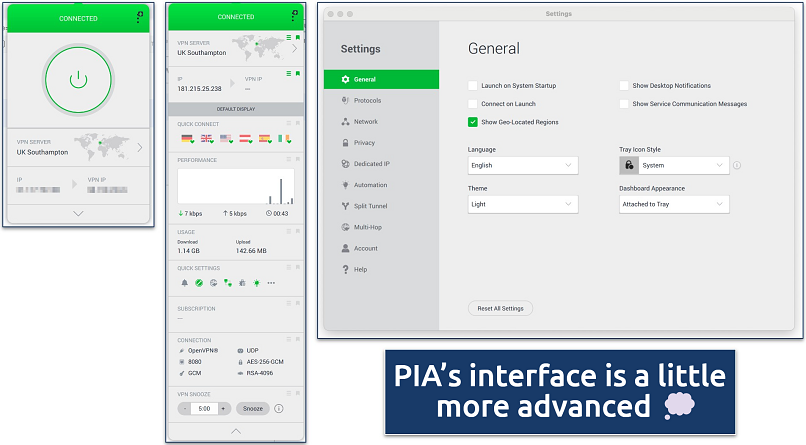 PIA's Settings panel has 10 submenus
PIA's Settings panel has 10 submenus
While both VPNs are compatible with a wide variety of routers and offer helpful installation guides, ExpressVPN provides custom router firmware for a more straightforward setup. Its router setup also supports a decent amount of customization with Device Groups, allowing you to select servers and protocols for your specific devices. In addition, it offers its own Aircove Go router, which is compact and travel-friendly and has the VPN pre-installed.
I’m also a big fan of ExpressVPN’s browser extensions, which serve as a “remote control” for the main app, giving you full VPN encryption over your browsing sessions. It has additional features like Spoof your location, which masks your geolocation data. HTTPS Everywhere automatically redirects your browser to secure HTTPS versions of websites. Plus, Block WebRTC prevents your real IP address from being revealed to sites you visit.
PIA also offers browser extensions, but these are only proxies and don’t offer the same level of security. Plus, its extensions are only available for Chrome, Firefox, and Opera, while ExpressVPN covers these plus Edge, Brave, and Vivaldi.
Winner
ExpressVPN is the better choice for installation and ease of use due to its faster setup, particularly on mobile devices, and its user-friendly interface. Its superior router support is also appealing if you're looking to extend VPN protection to your entire household.
Reliability & Support — ExpressVPN’s Excellent Live Chat
| Customer Support Features |
ExpressVPN |
Private Internet Access |
| 24/7 Live chat |
Yes, responds immediately |
Yes, responds within a minute |
| Email support |
Yes, via a form on the website |
Yes |
| Phone support |
No |
No |
| Step-by-step setup guides |
Yes |
Yes |
| Searchable knowledge base |
Yes |
Yes |
| Exhaustive FAQ section |
Yes |
Yes |
Both services offer 24/7 live chat, but ExpressVPN allows you to access support directly from its homepage, giving you quicker service. Or, you can save a few steps as it lets you conveniently launch a live chat support window right from the app. It also updates its knowledge base more frequently and organizes it more intuitively; I found PIA’s content a little frustrating to navigate.
PIA matches up well, providing competent support with occasional promotions that enhance support features. However, the quality of support from ExpressVPN often surpasses PIA with more personalized and detailed responses. For instance, with PIA, you have to chat with a bot first before being directed to a human agent. However, I got connected with one of ExpressVPN’s live support reps within less than a minute of opening the chat box.
I also applaud ExpressVPN’s engagement on social media. It has its own YouTube channel where it actively replies to viewer comments. PIA currently lacks a YouTube channel.
Both VPNs offer support in multiple languages, but the quality of non-English support can vary, with ExpressVPN maintaining a higher standard, according to my international colleagues.
Winner
ExpressVPN is the better choice for reliability and support due to its faster response times, more regularly updated knowledge base, and the ability of its support agents.
Pricing
|
ExpressVPN |
Private Internet Access |
| Starting Price |
$2.79/month |
$2.03/month |
| Price (On Renewal) |
$116.95 per year
(subject to change) |
$56.94 per year
(subject to change) |
| Money-Back Guarantee (Days) |
30 days |
30 days |
| Number of devices per license |
14 |
Unlimited |
| Router Setup (for Unlimited Devices) |
Easy setup with custom firmware and native app for several router models |
Manual setup |
ExpressVPN has more short-term options, with monthly, 6-month, and annual plans — PIA doesn’t have a 6-month option but instead, offers a 2-year plan.
You can also opt for a dedicated IP add-on, available with each VPN for a small monthly fee. PIA also offers an antivirus for an additional charge.
How much do ExpressVPN and Private Internet Access cost in comparison? ExpressVPN is a little 50+% more expensive than PIA for a long-term plan — but there’s more to it. If you compare monthly rates, PIA is only slightly less expensive. While the pricing strategy of VPNs is beyond the scope of this comparison, it was clear to me during testing that the latter invests a lot of money into maintaining its service, which could explain its higher price point.
Both offer similar payment options, including credit cards, PayPal, and crypto, ensuring flexibility regardless of your preferred method. While neither VPN offers a free plan, they both provide money-back guarantees, allowing you to test the service risk-free. Plus, both VPNs allow you to try out their mobile apps (Android and iOS) with a 7-day free trial.
ExpressVPN and PIA throw in a couple of bonus tools when you sign up. With ExpressVPN, you get access to its password manager and data breach scanner, called Keys. When you register for PIA, it gives you 500MB of encrypted cloud storage (via pCloud) free for 1 year.
For those seeking more protection, ExpressVPN also offers Identity Defender, a suite of identity theft protection tools available to new US-based subscribers. It includes 4 main features: ID Alerts for monitoring personal information, ID Theft Insurance (coverage up to $1 million), Data Removal for scanning and removing personal info from data brokers, and Credit Scanner.
You might also find PIA more appealing for covering more devices, as it allows unlimited simultaneous connections compared with ExpressVPN's limit of 14. This makes it excellent value for larger households.
PIA also demonstrates its commitment to privacy by offering free accounts to journalists, whistleblowers, and NGOs in vulnerable regions. If you think you might be eligible, you can apply on the PIA website.
Winner
PIA wins as it provides more affordable plans. But, if money isn’t a concern, then go for ExpressVPN. In my opinion, its reliability, speeds, and proven continuous investment into its technology justifies its higher price.
Our Methodology for Testing ExpressVPN and Private Internet Access
We performed a comprehensive evaluation of the three VPN services, focusing on key areas such as streaming, P2P file sharing, and online gaming. Our assessments also include an in-depth analysis of overall speed, security features, and privacy protections. To provide a well-rounded perspective, we considered these factors in relation to each service's pricing structure to determine which offers the most value.
Feel free to visit our testing methodology page to see the specific criteria and procedures we use. That way, you can conduct your own analysis and make an informed decision.
ExpressVPN vs Private Internet Access — Reddit Opinions
What are the opinions between ExpressVPN vs Private Internet Access on Reddit? Both of these VPNs have many admirers and positive comments, so there isn’t a clear preference for one over the other. ExpressVPN is commended for its reliability, fast speeds, and streaming capabilities and is recommended as an all-around service for general use. PIA is credited as an excellent choice for the security-conscious and for those who want a customizable torrenting experience.
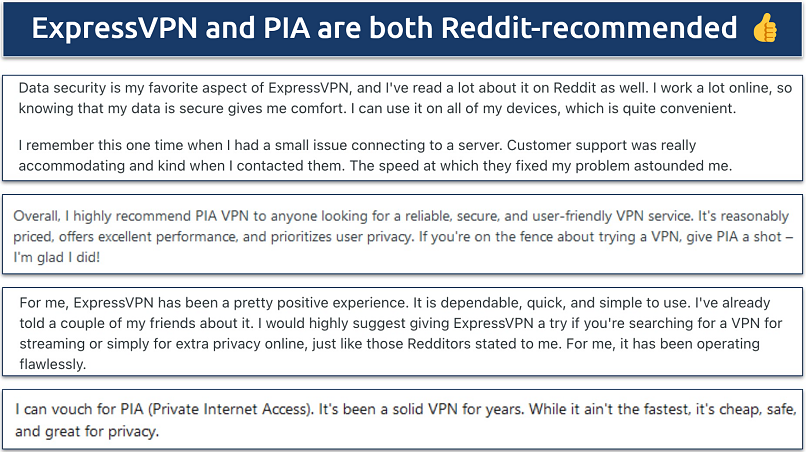 Redditors praise both services for their robust privacy practices
Redditors praise both services for their robust privacy practices












